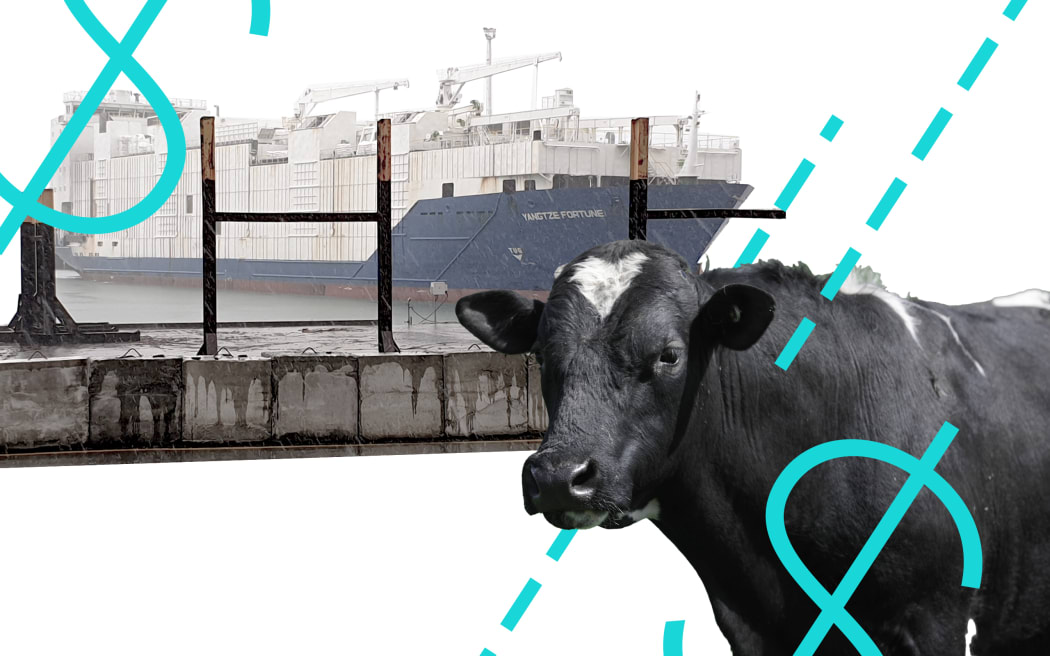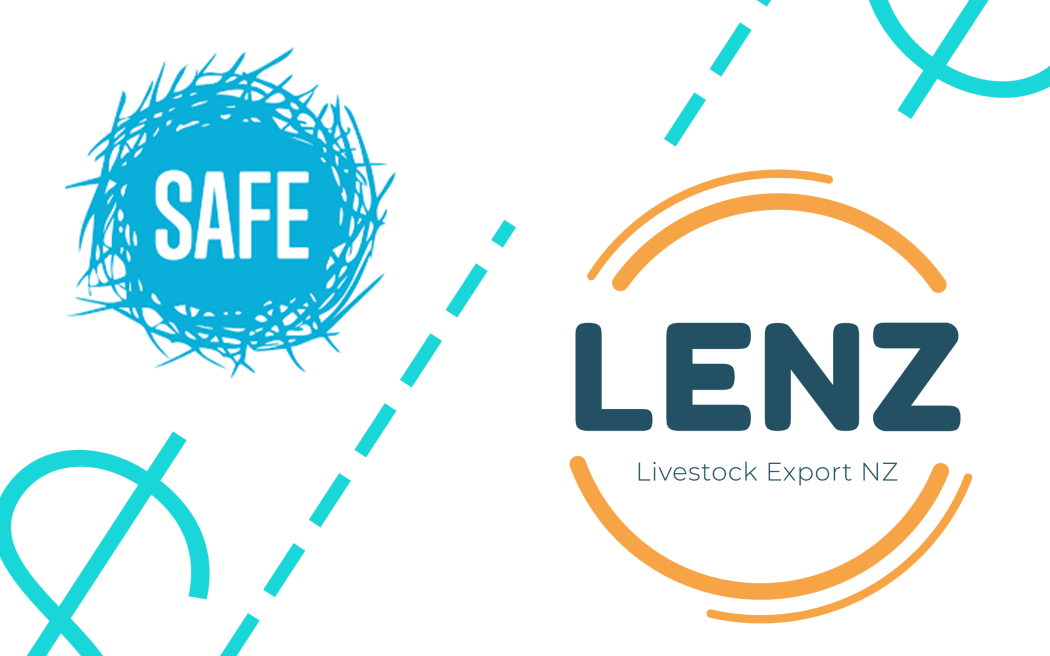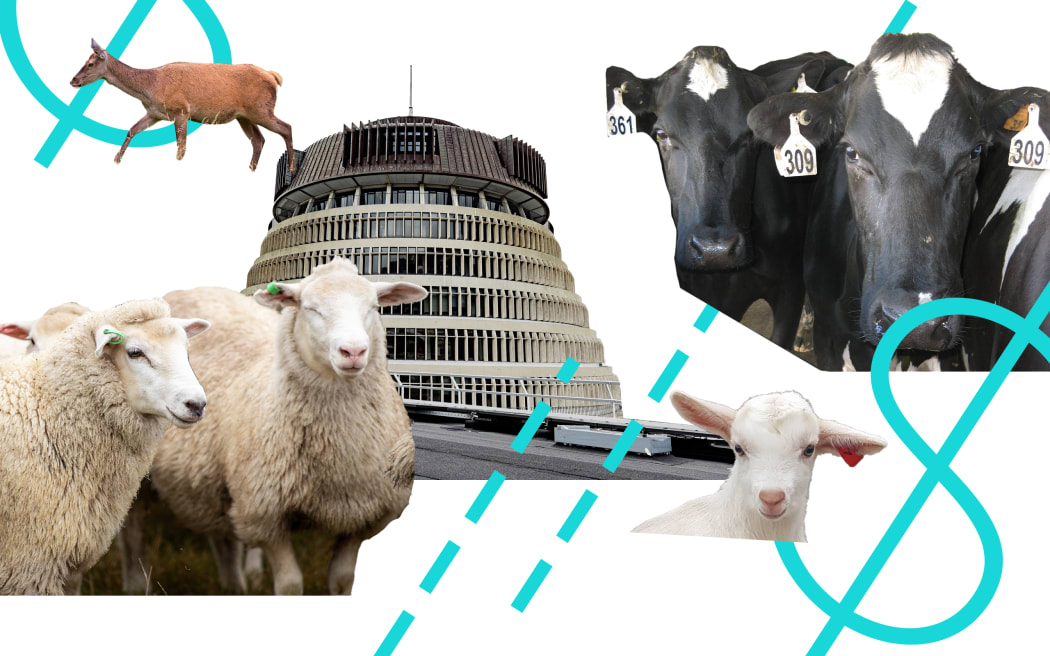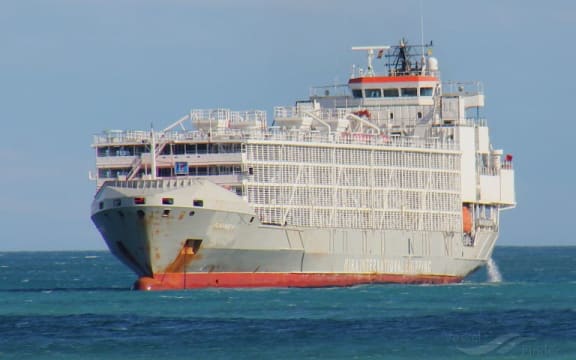
A ban on livestock exports will almost certainly be lifted - but the industry is wary of opposition Photo: RNZ
A $1 million lobbying campaign to persuade the government to restart live animal exports has been launched by key players in the agriculture industry.
The previous Labour government announced a ban on live animal exports by sea in 2021, which came into effect in April 2023.
The new government intends to change course, with the coalition agreements saying it will, "reverse the recent ban on live animal exports while ensuring the highest standards of animal welfare".
But Livestock Export New Zealand (LENZ) says without a major lobbying campaign, and a PR pitch to allay public concern about animal welfare standards, the government's pledge could stall or even fail.
A LENZ strategy document says it needs $1 million to ensure the ban is reversed.
The document says LENZ will spend $366,000 on a "trust and understanding" campaign, $100,000 on media training advocates and nearly $200,000 creating a "gold standard" for animal welfare.
LENZ says it will also spend $160,000 on "political lobbying and legal fees".
The document shows LENZ is on a fundraising drive and says financial contributions ranging between $2000 and $50,000 have already been received from vets, trucking companies and farmers.
"It is vital that the industry help to fund a sustained communications programme to influence public opinion ahead of the ban being included with a reinstatement bill," it says.

Photo: RNZ
'Counter-offensive' against criticism of live animal exports
The LENZ document says the group Save Animals From Exploitation (SAFE) will be a formidable opponent.
"SAFE are a well-funded organisation who led the campaign to have live exports banned and they have openly stated their intention to do everything possible to ensure the ban remains."
LENZ plans to parry the group with a "social media counter-offensive" and advocacy workshops "to train supply chain champions to be media ready".
The strategy document says the lobbying effort is essential as the issue cannot be left to MPs alone.
"The process of reversing legislation and writing the regulation that supports this and provides a framework for a high quality, new industry is a lengthy, resource heavy process that if left to politicians alone could take several years."
The strategy document sets a timeline of passing legislation to reverse the ban in April and live exports restarting in August.
In the initial phase of the lobbying effort, LENZ says it will spend $555,000 including on political lobbying, website creation, "PR assets" and a "social media counter offensive team".
SAFE CEO Debra Ashton said if LENZ felt it needed to spend $1 million making the case for live animal exports, it showed its argument was weak.
"We were really shocked at the lengths that they were prepared to go to overturn the ban," Ashton said.
"I think that if an industry or a trade needs to work that hard to try and convince people that what they're doing is okay I think they need to take a really hard look at themselves."
Animal welfare standards
LENZ chairman Mark Willis told RNZ that research the group commissioned showed the ban would cost $475m in lost GDP over the first couple of years and about $320m each year after that.
Some farmers would lose between $50,000 and $120,000 a year.
"It's a market which provides an enormous premium over the domestic market," Willis said. "Farmers were receiving something in the vicinity of close to double what those animals were valued for on the local market - so that's a really important income stream for them."
Willis said a new 'gold standard' of welfare would include minimum weight rules for livestock, reduced stocking densities and specialist stockmen and vets on vessels.
"An animal in that highly controlled environment on those boats is probably more likely to have a positive outcome than it even would in a normal, standard farming situation," he said.
"We can give New Zealanders the assurance that a new regime would be a big lift and the standards that we would be achieving would be the highest in the world."

Photo: RNZ
What led to a ban
Livestock exports have been part of the primary sector since the 1860s but took off in the mid-1980s.
In 2007, New Zealand banned live export for slaughter and since 2008 livestock exports by sea have been either for breeding or milking purposes, with China the major market.

Gulf Livestock 1 Photo: Frans Truyens via Vessel Finder
More than 5000 farmers have provided breeding cattle for export over the last decade.
The Ministry for Primary Industries initiated an independent review of live exports in 2020, after the sinking of Gulf Livestock 1, which resulted in the deaths of 41 crew and nearly 6000 cattle.
The vessel, registered to Panama and owned by a UAE shipping company, left Napier in August 2020 bound for China, but sank off the coast of Japan in a typhoon.
19 days at sea
SPCA Chief Scientific Officer Dr Arnja Dale said she was horrified at the prospect of live exports being reintroduced.
"It's very clear from the research that there is absolutely no way to achieve good animal welfare on long and complicated journeys."
She said the animals would be at sea for 19 days on a trip to China.
During that journey the animals were often fearful, anxious and in pain, facing disease, noise, motion sickness, heat stress and a buildup of urine and excrement, Dale said.
"There is actually no way to achieve any good welfare outcomes for animals that are exported by ship."
Dale said there was a global move away from live animals exports, with the UK recently passing laws to ban them and Australia committing to phasing them out.
"The shame of turning back the tide when all these other countries are going ahead with the ban - it's a national embarrassment."
Willis said the UK and Australian moves were about banning animal exports for slaughter which New Zealand had stopped years ago.
The lobbying effort here would focus on ensuring the public and MPs better understood the industry.
"We've probably been quite ineffective at telling our story and maybe the story that the public have been receiving hasn't always had balance and so we would just like the opportunity for New Zealanders to see both sides of the equation and to understand it more fully."
Progress 'with some haste'
ACT MP Andrew Hoggard, former president of Federated Farmers and now Associate Minister of Agriculture, has the responsibility of reintroducing the trade.

Associate Agriculture Minister Andrew Hoggard Photo: RNZ / Angus Dreaver
Hoggard told RNZ it was one of his top priorities in the portfolio and he wanted "progress with some haste".
He would seek advice from officials on how to raise welfare standards, which MPI was already working on before the ban came into effect.
New Zealand had a strong reputation on animal welfare and it was important it was not harmed by resuming the trade, he said.


